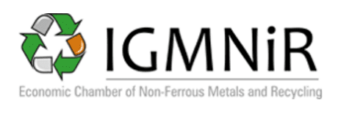Other metals and articles thereof
Other metals include such raw materials as manganese, antimony, chromium, cobalt and magnesium. In 2020, the industry’s exports accounted for 0.7% of Polish goods exports. In 2021, articles worth €2,077.5 million were exported. Sales were for each of the other metals. This was over 25% more than in the previous year and over 27% more than in the year before. Poland’s main partners in this industry, in terms of the value of exported goods, are Germany, the Czech Republic, and the United Kingdom. In 2021, exports of the industry accounted for 0.7% of Polish goods exports.

The vast majority of lead and zinc produced in Poland comes from secondary sources, which is important for energy intensity of production and environmental protection. In turn, the share of processed products in total exports is increasing. There are still areas for technologically advanced and innovative processing of metals for their applications in electronics, IT, telecommunications and other sectors. In Poland there are also opportunities for the recovery of rare metals such as germanium, indium and others, which are used in modern electronic devices. However, this issue requires further research and analysis of the profitability of
Industry definition
The industry includes the following CN codes: 7107, 7109, 7111, 7501 to 7508, 7801, 7802, 7804, 7806, 7901 to 7905, 7907, 8001 to 8003, 8007, 8101 to 8105, 8107 to 8113, 8301, 8305 to 8307, 8309 to 8311.
These include, but are not limited to, nickel and articles of nickel, lead, lead waste and articles, zinc, tin, magnesium, cobalt, manganese, beryllium, chromium, antimony, and other raw materials and articles thereof.
Value of industry exports from Poland [EUR]
Useful contacts

Economic Chamber of Non-Ferrous Metals and Recycling
- Tel.: +48 322 042 024
- E-mail: biuro@igmnir.pl
Spis treściTable of contents
- Everything
-
No search results. Please try again.
The Export Promotion Portal uses cookies to make it easier for users to use the website and for statistical purposes. If you do not block these files, you agree to their use and saving in the memory of your computer or other device. Remember that you can change your browser settings to block the storage of cookies. More information can be found in Privacy Policy and Terms and conditions.